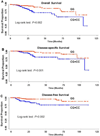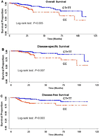Pre-microRNA variants predict HPV16-positive tumors and survival in patients with squamous cell carcinoma of the oropharynx
- PMID: 23219900
- PMCID: PMC3563870
- DOI: 10.1016/j.canlet.2012.11.048
Pre-microRNA variants predict HPV16-positive tumors and survival in patients with squamous cell carcinoma of the oropharynx
Abstract
To identify non-tumor biomarkers for prediction of tumor HPV status and prognosis of patients with squamous cell carcinoma of the oropharynx (SCCOP), we evaluated the association of single nucleotide polymorphisms (SNPs) in pre-miRNAs with HPV16 status and survival for SCCOP patients. We analyzed HPV16 status in tumor specimens and genotyped four SNPs in pre-miRNAs (hsa-mir-146a rs2910164 G>C, hsa-mir-149 rs2292832 G>T, hsa-mir-196a2 rs11614913 C>T, and hsa-mir-499 rs3746444 A>G) in 309 SCCOP patients. Unconditional logistic regression models were used for calculation of odds ratio (OR) and 95% confidence intervals (CIs), and Kaplan-Meier analysis and Cox proportional hazards regression were used to evaluate associations. We found that statistically significant associations with HPV16-positive SCCOP and survival were found for hsa-mir-146a rs2910164 and hsa-mir-196a2 rs11614913, while such similar associations were not observed for hsa-mir-149 rs2292832 and hsa-mir499 rs3746444. Compared with those with corresponding hsa-mir-146a CG/CC and has-mir-196a2 CC genotypes, the hsa-mir-146a GG and hsa-mir-196a2 CT/TT wild-type genotypes were significantly associated with HPV16-positive tumor status (adjusted OR, 2.4; 95% CI, 1.4-4.1 and adjusted OR, 2.1, 95% CI, 1.2-3.6), respectively. Patients having hsa-mir-146a rs2910164 GG and hsa-mir196a2 rs11614913 CT/TT genotypes had significantly better overall, disease-specific, and disease-free survival compared with those having the corresponding CG/CC and CC genotypes, respectively. Furthermore, these genotypes were significantly associated with reduced risk of overall death, death owing to disease, and recurrence after adjustment for important prognostic confounders including HPV status, smoking, and stage. Our findings indicate pre-miRNA polymorphisms may predict tumor HPV16-positive SCCOP cases and may be prognostic biomarkers for SCCOP.
Copyright © 2012 Elsevier Ireland Ltd. All rights reserved.
Conflict of interest statement
No potential conflicts of interest were disclosed.
Figures


Similar articles
-
Pre-miRNA variants as predictors of clinical outcome in patients with squamous cell carcinomas of the nonoropharynx.Oncotarget. 2016 May 3;7(18):26444-53. doi: 10.18632/oncotarget.8512. Oncotarget. 2016. PMID: 27050146 Free PMC article.
-
MicroRNA variants increase the risk of HPV-associated squamous cell carcinoma of the oropharynx in never smokers.PLoS One. 2013;8(2):e56622. doi: 10.1371/journal.pone.0056622. Epub 2013 Feb 15. PLoS One. 2013. PMID: 23457596 Free PMC article.
-
Genetic variants in microRNA-binding sites of DNA repair genes as predictors of recurrence in patients with squamous cell carcinoma of the oropharynx.Int J Cancer. 2017 Oct 1;141(7):1355-1364. doi: 10.1002/ijc.30849. Epub 2017 Jul 7. Int J Cancer. 2017. PMID: 28646528 Free PMC article.
-
The association of common functional polymorphisms in mir-146a and mir-196a2 and hepatocellular carcinoma risk: evidence from a meta-analysis.Medicine (Baltimore). 2014 Dec;93(29):e252. doi: 10.1097/MD.0000000000000252. Medicine (Baltimore). 2014. PMID: 25546664 Free PMC article. Review.
-
Genetic variations in MicroRNA genes and cancer risk: A field synopsis and meta-analysis.Eur J Clin Invest. 2020 Apr;50(4):e13203. doi: 10.1111/eci.13203. Epub 2020 Mar 6. Eur J Clin Invest. 2020. PMID: 31984489 Review.
Cited by
-
Polymorphism in miR-146a associated with clinical characteristics and outcomes in gastric cancer patients treated with adjuvant oxaliplatin and fluoropyrimidines.Onco Targets Ther. 2015 Sep 16;8:2627-33. doi: 10.2147/OTT.S89635. eCollection 2015. Onco Targets Ther. 2015. PMID: 26396533 Free PMC article.
-
Pri-let-7a-1 rs10739971 polymorphism is associated with gastric cancer prognosis and might affect mature let-7a expression.Onco Targets Ther. 2016 Jul 4;9:3951-62. doi: 10.2147/OTT.S100481. eCollection 2016. Onco Targets Ther. 2016. PMID: 27445488 Free PMC article.
-
Significance of microRNA-related variants in susceptibility to recurrence of oropharyngeal cancer patients after definitive radiotherapy.Oncotarget. 2016 Jun 7;7(23):35015-25. doi: 10.18632/oncotarget.9014. Oncotarget. 2016. PMID: 27145460 Free PMC article.
-
Prognostic role of common microRNA polymorphisms in cancers: evidence from a meta-analysis.PLoS One. 2014 Oct 22;9(10):e106799. doi: 10.1371/journal.pone.0106799. eCollection 2014. PLoS One. 2014. PMID: 25337946 Free PMC article.
-
Pre-miRNA variants as predictors of clinical outcome in patients with squamous cell carcinomas of the nonoropharynx.Oncotarget. 2016 May 3;7(18):26444-53. doi: 10.18632/oncotarget.8512. Oncotarget. 2016. PMID: 27050146 Free PMC article.
References
-
- Sturgis EM, Cinciripini PM. Trends in head and neck cancer incidence in relation to smoking prevalence: an emerging epidemic of human papillomavirus-associated cancers? Cancer. 2007;110:1429–1435. - PubMed
-
- Siegel R, Naishadham D, Jemal A. Cancer statistics, 2012. CA Cancer J Clin. 2012;62:10–29. - PubMed
-
- Chaturvedi AK, Engels EA, Anderson WF, Gillison ML. Incidence trends for human papillomavirus-related and -unrelated oral squamous cell carcinomas in the United States. J Clin Oncol. 2008;26:612–619. - PubMed
-
- D'Souza G, Kreimer AR, Viscidi R, Pawlita M, Fakhry C, Koch WM, Westra WH, Gillison ML. Case-control study of human papillomavirus and oropharyngeal cancer. N Engl J Med. 2007;356:1944–1956. - PubMed
-
- Gillison ML, D'Souza G, Westra W, Sugar E, Xiao W, Begum S, Viscidi R. Distinct risk factor profiles for human papillomavirus type 16-positive and human papillomavirus type 16-negative head and neck cancers. J Natl Cancer Inst. 2008;100:407–420. - PubMed
Publication types
MeSH terms
Substances
Grants and funding
LinkOut - more resources
Full Text Sources
Other Literature Sources

